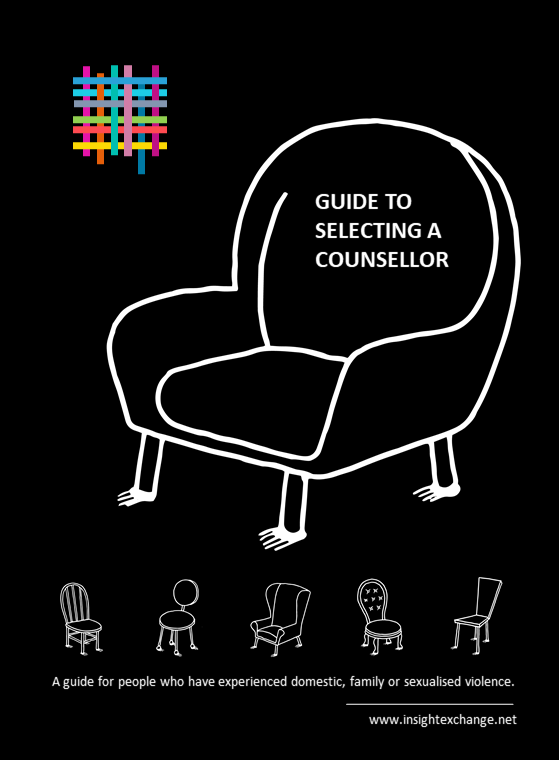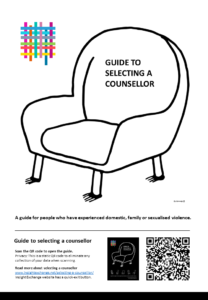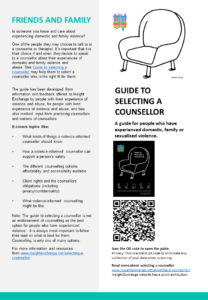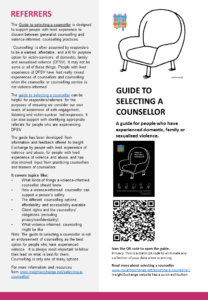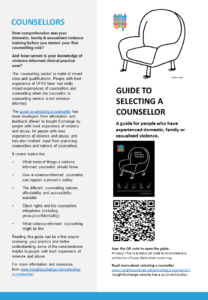Thinking about talking to someone about your experiences?
Talking with someone about your experiences of violence and abuse is a personal decision. It can be valuable but is worth thinking carefully about.
You may be thinking about talking to a friend, family member, colleague, manager, service or someone else. Regardless of who you speak with, it is important they understand that your dignity and safety are central to how you live and make decisions. It is important that they follow your lead.
Thinking about talking to a counsellor?
One of the people you may choose to talk to is a counsellor or therapist. It’s important that it is your choice if and when you decide to speak to a counsellor about your experiences of domestic and family violence and abuse. This Guide to selecting a counsellor may help you select a counsellor who is the right fit for you.
Guide to selecting a counsellor
What you want to talk about in counselling sessions may change. And your circumstances may change. That is ok. It is really important that the counsellor you choose has a good understanding of domestic, family and sexualised violence and is ready to follow your lead and support your safety.
The guide is designed to support your selection of a counsellor and to support your reflections about the value and safety of the counselling experience.
Explore the Guide to selecting a counsellor
Content - read the parts that matter most to you at the time and in any order.
- Understanding violence and abuse
- Supporting Safety
- Supporting Access
- Before Counselling
- During Counselling
- After Counselling
- Support Services
*Insight Exchange is not a provider of counselling services. Information about counselling options is included in the guide.
Professional codes and guidelines
Counsellors can be bound by different ‘professional codes’, guidelines and legislation.
Not all counsellors have the same qualifications, or be registered as a member of a professional organisation. The professional status, codes, guidelines, legislative requirements and responsibilities of a counsellor can vary. This can make a big difference to your rights to privacy and confidentiality and their responsibilities as a counsellor.
Information about codes of ethics and guidelines are available online from the relevant professional organisations.
- Australian Health Practitioner Regulation Agency (AHPRA): ahpra.gov.au/ (Only registered health professionals are regulated by the Australian Health Practitioner Regulation Agency.)
- Australian Psychological Society: psychology.org.au
- Australian Association of Social Workers: aasw.asn.au
- Psychotherapy and Counselling Federation of Australia: pacfa.org.au
- The Australian Counselling Association: theaca.net.au
- Australian Institute of Family Therapists: aaft.asn.au
If you think the code of practice has been breached, you can make a complaint. For more information, visit the Australian Health Practitioner Regulation Agency: Australian Health Practitioner Regulation Agency - Concerns about practitioners (ahpra.gov.au)
Counsellors
Are you studying counselling or working as a practicing counsellor and looking to build your understanding of domestic, family and sexualised violence?
View the Foundations and Foundations Applied resources and accompanying Reflections Kit.
View the Language and Violence Masterclass hosted on the Insight Exchange language lab
Read the Guide to selecting a counsellor
Download A4 posters introducing the guide to selecting a counsellor
Download the standard digital poster with static QR code to the Guide to selecting a counsellor
Poster for Family and Friends: Download the digital poster with static QR code to the Guide to selecting a counsellor
Poster for Referrers: Download the digital poster with static QR code to the Guide to selecting a counsellor
Poster for Counsellors: Download the digital poster with static QR code to the Guide to selecting a counsellor

